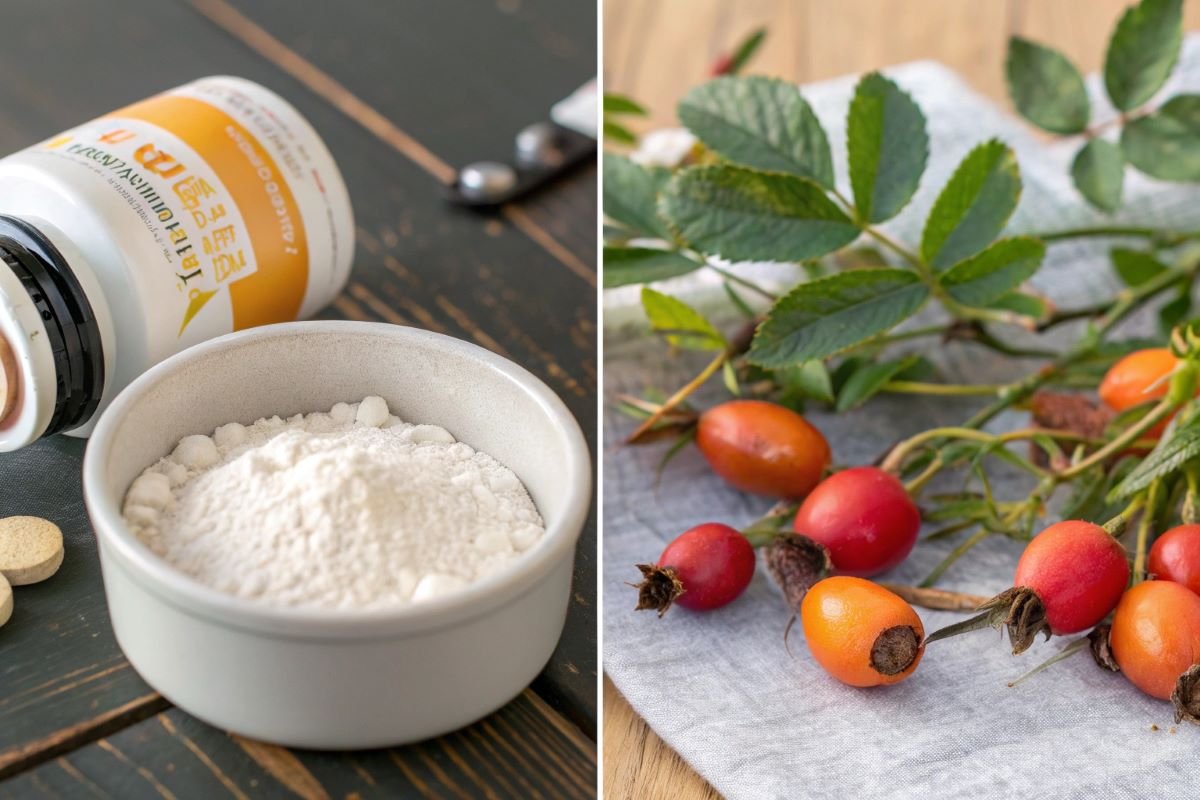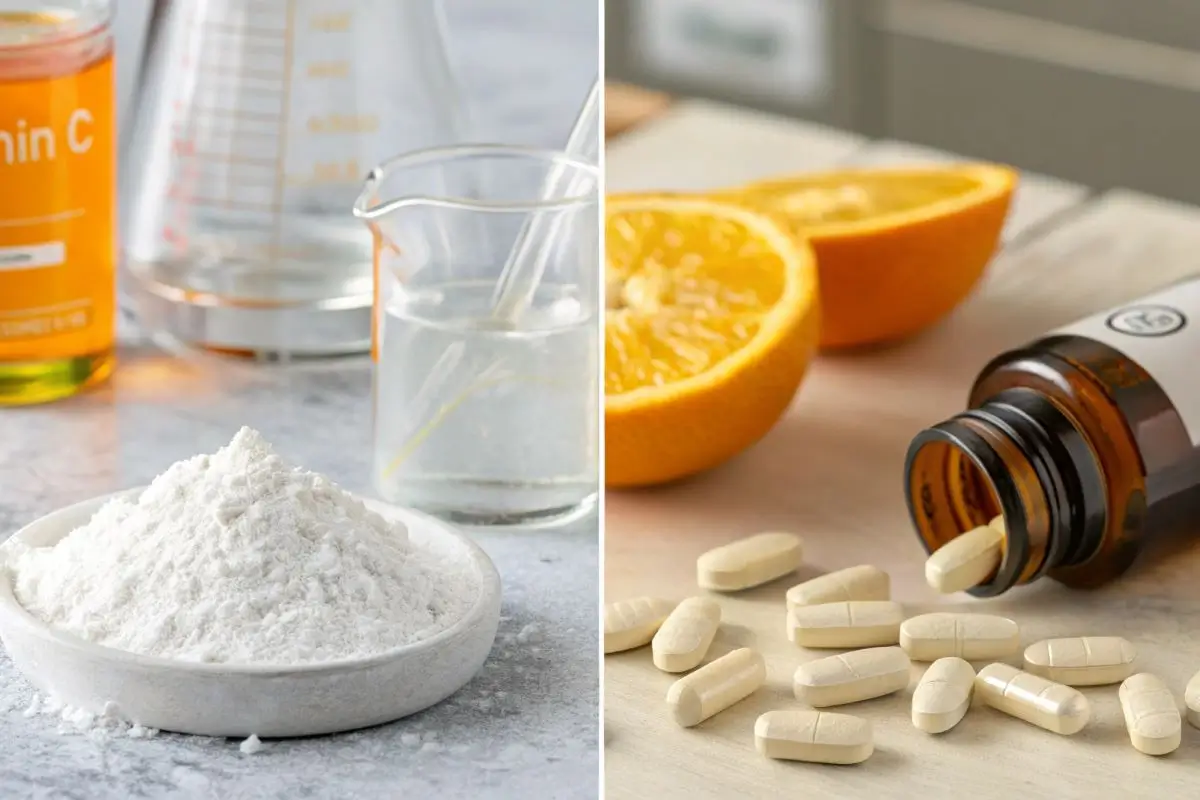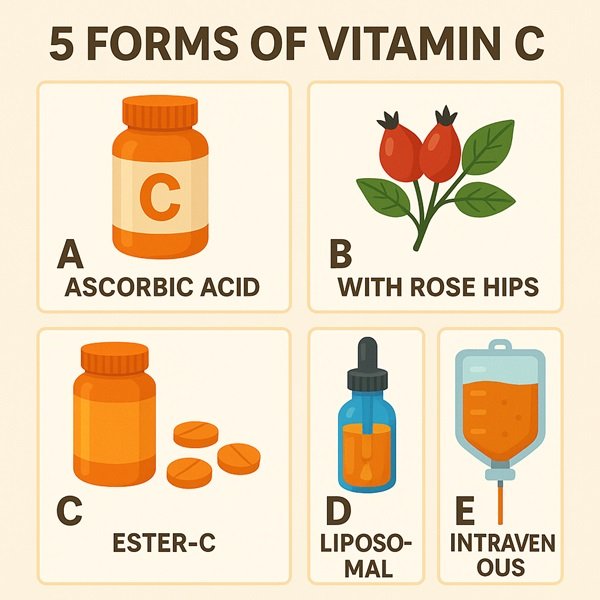Is Vitamin C with Rose Hips Better Than Regular Vitamin C?
Do you really need to pay the extra premium of Rose hips inside your Vitamin C supplement or is it just another marketing trick by supplement companies?

Recently while reading an article on Substack, I came across a claim that all the thousands of research studies on Vitamin C are based solely on ascorbic acid, suggesting that alternative forms like liposomal formulations or those with rose hips added might be nothing more than clever marketing. This got me wondering – what’s actually the deal with these premium-priced rose hip vitamin C supplements that seem to be everywhere these days?
Vitamin C supplements with rose hips have gained considerable traction in health stores and online marketplaces.
Many consumers willingly pay extra for these specialized formulations, but does science support this choice? This article examines the evidence comparing rose hip-enhanced vitamin C supplements with standard options to help you decide if the upgrade is worth your money.
What is Regular Vitamin C?

Regular vitamin C, scientifically known as ascorbic acid, is a water-soluble vitamin important for numerous bodily functions.
Most commonly available supplements contain synthetic ascorbic acid (meaning it was made in a Lab), which is chemically identical to the vitamin C found in foods. Common food sources include citrus fruits, strawberries, bell peppers, and broccoli.
What are Rose Hips?

Rose hips are the fruit that develops on rose plants after flowering. They’ve been used in traditional medicine for centuries and naturally contain vitamin C along with other compounds:
- Various antioxidants including polyphenols and carotenoids
- Flavonoids and bioflavonoids
- Small amounts of vitamins A and E
- Certain minerals and fatty acids
Rose Hip Vitamin C vs. Regular Vitamin C
For those of you who like to skim articles (instead of reading) here’s a table I prepared that compares Vitamin C w/ Rose Hips with regular Vitamin C.
| Feature | Rose Hip Vitamin C | Regular Vitamin C (Ascorbic Acid) |
|---|---|---|
| Source | Natural (from rose hips, often mixed with ascorbic acid) | Typically synthetic (lab-made) |
| Vitamin C Content | Variable (lower per gram) | Consistent and standardized |
| Additional Compounds | Contains natural bioflavonoids, antioxidants | None |
| Absorption (Bioavailability) | Similar to regular vitamin C | Well-established and reliable |
| Cost | Generally more expensive | More affordable |
| Research Basis | Fewer specific studies on rose hips alone | Thousands of clinical studies |
| Anti-inflammatory Properties | May offer added benefits due to other plant compounds | Only basic vitamin C effects |
| Taste | May taste slightly herbal or fruity | Often sour or neutral |
| Common Use | Chosen for more “natural” supplements and plant-based products | Used in most vitamin C supplements and drinks |
| Best for People Who… | Prefer plant-based, whole-food sources | Want reliable, affordable vitamin C |
Does Rose Hip Improve How Well Vitamin C is Absorbed?
One of the key things to look at is whether rose hip helps your body absorb vitamin C better — and if so, by how much. Is it actually more effective than regular vitamin C (ascorbic acid)? I looked into the scientific literature to find out.
Here’s what I discovered:
- There are almost zero studies that directly compare the bioavailability of Rose Hip Vitamin C and Regular Vitamin C.
- The only study I could find that suggests that the presence of bioflavonoids in natural sources can enhance vitamin C’s stability and bioavailability is a 1988 study by Vinson and Bose who found that a 500-mg supplement of synthetic ascorbic acid, given in a natural citrus extract containing bioflavonoids, was 35% more bioavailable than synthetic ascorbic acid alone, based on plasma levels.
- A review by the Linus Pauling Institute analyzed 10 clinical studies comparing vitamin C absorption from flavonoid-containing foods and found no appreciable differences in most cases.
- Another study, “Comparative Study of Bioactive Compounds and Biological Activities of Five Rose Hip Species Grown in Sicily” noted that the high content of carotenoids and flavonoids in rose hips prevents the oxidation of vitamin C, thus increasing its stability and bioavailability. (Ed. note: This is only suggestive and didn’t actually prove the bioavailability part).
- Another 2013 study published in the journal “Nutrients” examined vitamin C’s role as a cofactor in biosynthesis and compared synthetic vs natural sources. While natural sources include additional nutrients, human studies showed no significant difference in bioavailability between synthetic and natural vitamin C, though animal studies found some variation.
- A 2004 study concluded that Vitamin C absorption can be affected by food components, with one study showing polyphenol-rich grape juice significantly attenuated vitamin C absorption, suggesting that the polyphenolic compounds in rose hip might similarly influence its absorption.
- A 2012 study on horses supplemented with 250mg of natural vitamin C from rose hip powder daily showed significant increases in serum vitamin C concentration after 14 days, though direct comparisons to synthetic ascorbic acid are lacking.
There is insufficient direct evidence from the research to conclusively determine whether vitamin C from rose hip demonstrates superior bioavailability compared to regular ascorbic acid, despite theoretical advantages.
What about other forms of Vitamin C?
Other than Rose Hip Vitamin C there are other forms that promise better bioavailability like Liposomal Vitamin C, Ester-C and Intravenous. Here’s what the scientific literature say about them:
Liposomal Vitamin C
- A 2024 study (randomized, double-blind, placebo-controlled trial) published in the European Journal of Nutrition, concluded that Liposomal vitamin C significantly outperforms standard vitamin C with 27% higher maximum plasma concentration and 21% higher total absorption (area under the curve), demonstrating that liposomal delivery system substantially impact bioavailability.
- Another, 2016 study published in Nutrition & Metabolism Insights found that oral delivery of 4 g liposomal vitamin C produced circulating concentrations greater than unencapsulated oral vitamin C. This suggests liposomal encapsulation can improve absorption compared to regular vitamin c supplements.
- Another study from 2020, published in the Journal of Liposome Research, compared liposomal versus non-liposomal vitamin C in a crossover trial, finding better oral bioavailability for the liposomal form.
- The Linus Pauling Institute also mentions a small trial where 4 g liposomal vitamin C resulted in greater plasma concentration over four hours compared to unencapsulated vitamin C, though still lower than intravenous levels (Supplemental Forms | Linus Pauling Institute).
Ester-C
- A study published in SpringerPlus in 2016 found that a single dose of 1000 mg Ester-C significantly increased vitamin C levels in leukocytes at 8 and 24 hours compared to regular ascorbic acid, while plasma levels were similar between the two. This implies that Ester-C may be better retained in cells – potentially offering benefits for immune support.
- A clinical trial published in Advances in Therapy found that Ester-C caused fewer epigastric adverse effects than regular ascorbic acid, which might make it a preferable option for those sensitive to acidity, though this does not directly address bioavailability.
However, not all studies agree.
- The Linus Pauling Institute notes that overall, the impact of different forms on bioavailability is often negligible, with some assessments showing no significant difference in absorption between Ester-C and ascorbic acid.
- ConsumerLab.com also states there is no evidence of a significant difference in absorption, suggesting the advantage might be specific to cellular retention rather than plasma levels.
Intravenous
- In a hierarchy of bioavailability, intravenous vitamin C produces the highest circulating concentrations, followed by liposomal oral delivery, with standard oral vitamin C showing the lowest bioavailability. [1]
KEY TAKEAWAY
Intravenous Vitamin C is best for bioavailability, followed by Liposomal. Rose Hip Vitamin C shows mix results in terms of absorption while Ester-C shows better retention.

Added Benefits of Rose Hips?
Rose hips contain compounds beyond vitamin C that may offer additional health benefits:
- Anti-inflammatory effects: A 2008 study found rose hip powder reduced pain in osteoarthritis patients. This effect appears related to specific anti-inflammatory compounds in rose hips called galactolipids.
- Antioxidant activity: Research suggests that rose hips have antioxidant capacity beyond that of their vitamin C content alone = they contain other beneficial compounds.
- Skin health support: Some evidence suggests the combination of vitamin C with other rose hip components may benefit skin health, though most research focuses on topical applications rather than supplements.
- High natural vitamin C content: Rose hip contains exceptionally high natural vitamin C content, with studies showing concentrations ranging from 0.87% to 1.85% by weight in wild varieties from the Karaganda region.
- Enhanced nutrient profile: Research shows Rose hip provides an enhanced nutritional profile beyond just vitamin C, containing beneficial compounds like carotenoids (44 mg%) and flavonoids (323 mg%) that may interact with vitamin C metabolism.
(Ed. note: It’s worth noting that many studies examining rose hip benefits used concentrated extracts rather than the amounts typically found in vitamin C supplements)
Cost and Accessibility
Rose hip vitamin C supplements typically cost 30-100% more than basic ascorbic acid supplements. For example, a standard 1000mg vitamin C supplement might cost $0.10-0.20 per dose, while rose hip formulations often cost $0.25-0.40 per dose or more.
Are you getting your money’s worth? That depends on what you’re seeking. If your goal is simply to prevent vitamin C deficiency, basic ascorbic acid offers the most economical solution.
Potential Drawbacks or Myths
Let’s check some common claims about rose hip vitamin C:
“Rose hips make vitamin C last longer in the body”
This claim has limited scientific support. The human body tightly regulates vitamin C levels, and there’s little evidence that anything in rose hips significantly extends vitamin C retention. A study in the British Journal of Nutrition found that plasma vitamin C levels followed similar patterns after consumption of either natural or synthetic vitamin C.
“All rose hip supplements are superior to synthetic forms”
Not all rose hip supplements are created equal. The concentration of active compounds varies dramatically depending on the species of rose, growing conditions, processing methods, and storage. Many supplements contain minimal amounts of actual rose hip.
What about marketing hype?
Can we talk about those flashy labels for a sec? Many supplement companies make vague claims about “synergistic effects” or “whole food complexes” without solid research backing. When a product costs three times more but offers marginal benefits, you gotta wonder who’s really benefiting.
How to Choose the Right Supplement
When selecting a vitamin C supplement, consider:
- Your health objectives: Are you seeking only vitamin C or additional plant compounds?
- Dosage: How much vitamin C do you actually need? (The RDA is only 75-90mg for adults)
- Value: Are potential additional benefits worth the price premium?
- Quality: Does the manufacturer provide information about rose hip sourcing and processing?
Here’s a list with the best selling Vitamin C supplements on Amazon (auto-generated list).
Bottom Line
So, is vitamin C with rose hips better than regular vitamin C? The answer isn’t black and white.
Standard ascorbic acid remains the most researched, cost-effective form of vitamin C supplementation with proven benefits.
The additional compounds in rose hips may offer complementary benefits, particularly for inflammation and antioxidant activity, but evidence for enhanced vitamin C absorption or retention remains limited.
If budget isn’t a concern and you’re interested in the potential additional benefits of rose hip compounds, these supplements might be worth trying.
However, if your primary goal is vitamin C supplementation, standard ascorbic acid provides a reliable, well-studied, and economical option.










